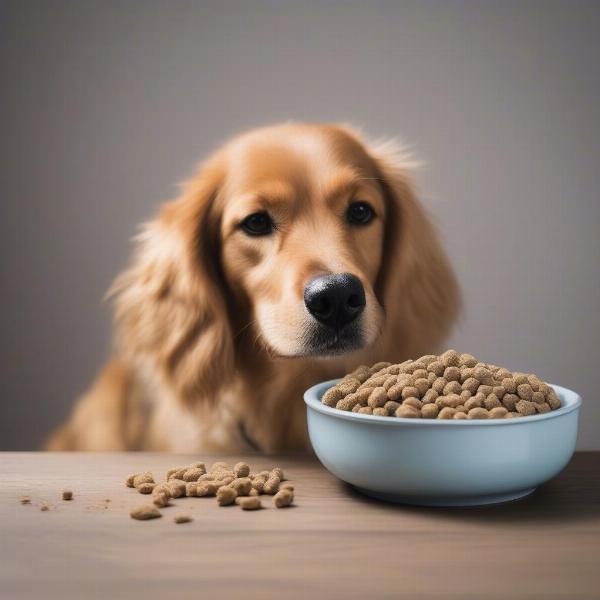Immune-mediated hemolytic anemia (IMHA) is a serious condition where a dog’s immune system mistakenly attacks its own red blood cells. Managing this complex disease requires a multifaceted approach, and diet plays a crucial role. Choosing the right imha dog diet can support recovery, manage symptoms, and improve overall well-being. This article will explore the critical aspects of nutrition for dogs with IMHA, offering practical guidance and valuable insights for concerned owners.
Understanding the Role of Diet in IMHA
During IMHA, the body struggles to maintain adequate red blood cell levels, impacting oxygen delivery and causing fatigue, weakness, and pale gums. A tailored imha dog diet provides essential nutrients for red blood cell production and supports the immune system. It also addresses potential complications like gastrointestinal upset, which is often present in dogs with IMHA.
Key Nutritional Considerations for Dogs with IMHA
Several nutritional factors are particularly important when creating an imha dog diet:
- High-Quality Protein: Protein is essential for building new red blood cells. Choose easily digestible protein sources like chicken, turkey, or fish.
- Iron: Iron is a crucial component of hemoglobin, the protein within red blood cells that carries oxygen. Your veterinarian may recommend iron supplementation.
- B Vitamins: B vitamins, especially B12 and folate, are crucial for red blood cell formation.
- Antioxidants: Antioxidants like Vitamin E and Vitamin C can help protect red blood cells from further damage.
- Omega-3 Fatty Acids: These fatty acids have anti-inflammatory properties and may help reduce the immune response.
Creating a Balanced IMHA Dog Diet
Creating an optimal imha dog diet often involves working closely with your veterinarian. They can assess your dog’s specific needs and recommend appropriate dietary modifications or supplements. Here are some general guidelines:
- Homemade Diets: While homemade diets offer flexibility, ensuring nutritional balance is critical. Consult a veterinary nutritionist to formulate a recipe that meets all of your dog’s needs during IMHA.
- Commercial Diets: Several high-quality commercial diets are available, and your veterinarian can help you select one suitable for your dog. Look for diets formulated for sensitive stomachs or with added antioxidants and omega-3 fatty acids.
What to Avoid in an IMHA Dog Diet
Certain foods can exacerbate IMHA symptoms or interfere with treatment. It’s best to avoid the following:
- Foods High in Fat: Fatty foods can worsen gastrointestinal upset.
- Artificial Colors and Preservatives: These additives can trigger immune reactions.
- Table Scraps: Human food is often unbalanced and can contain ingredients toxic to dogs.
Monitoring and Adjustments
Regular monitoring is crucial. Your veterinarian will likely recommend blood tests to track your dog’s red blood cell count and overall health. Based on these results, adjustments to the diet may be necessary.
 A dog eating food specifically formulated for IMHA
A dog eating food specifically formulated for IMHA
Conclusion
A carefully planned imha dog diet is a cornerstone of managing this challenging disease. By focusing on providing essential nutrients and avoiding potential triggers, you can significantly contribute to your dog’s comfort and recovery journey. Work closely with your veterinarian to create a personalized nutrition plan that best supports your dog’s individual needs.
FAQ
- What is the best food for a dog with IMHA? There is no single “best” food. The ideal diet depends on your dog’s specific needs and should be determined in consultation with your veterinarian.
- Can diet alone cure IMHA? Diet is a crucial supporting element, but IMHA usually requires veterinary treatment including medications.
- Are there any supplements that can help dogs with IMHA? Your veterinarian may recommend supplements like iron or B vitamins, depending on your dog’s specific needs.
- How often should I adjust my dog’s IMHA diet? Your veterinarian will advise based on regular monitoring and blood tests.
- What are the signs that my dog’s IMHA diet needs adjustment? Changes in appetite, energy levels, or gastrointestinal symptoms can indicate a need for dietary adjustments. Consult your veterinarian.
- Can I give my dog treats if they have IMHA? Discuss appropriate treats with your veterinarian. Some treats may contain ingredients that interfere with IMHA management.
- How long will my dog need to be on a special IMHA diet? The duration depends on the severity and progression of the disease. Your veterinarian will provide guidance based on your dog’s individual response.
ILM Dog is your trusted partner in canine care. We offer expert advice and resources on all aspects of dog ownership, from breed selection and health to training and nutrition. Whether you’re a seasoned dog owner or just starting your journey, we’re here to support you. Contact us today for personalized guidance. Email: [email protected], Phone: +44 20-3965-8624. Learn more at ILM Dog.